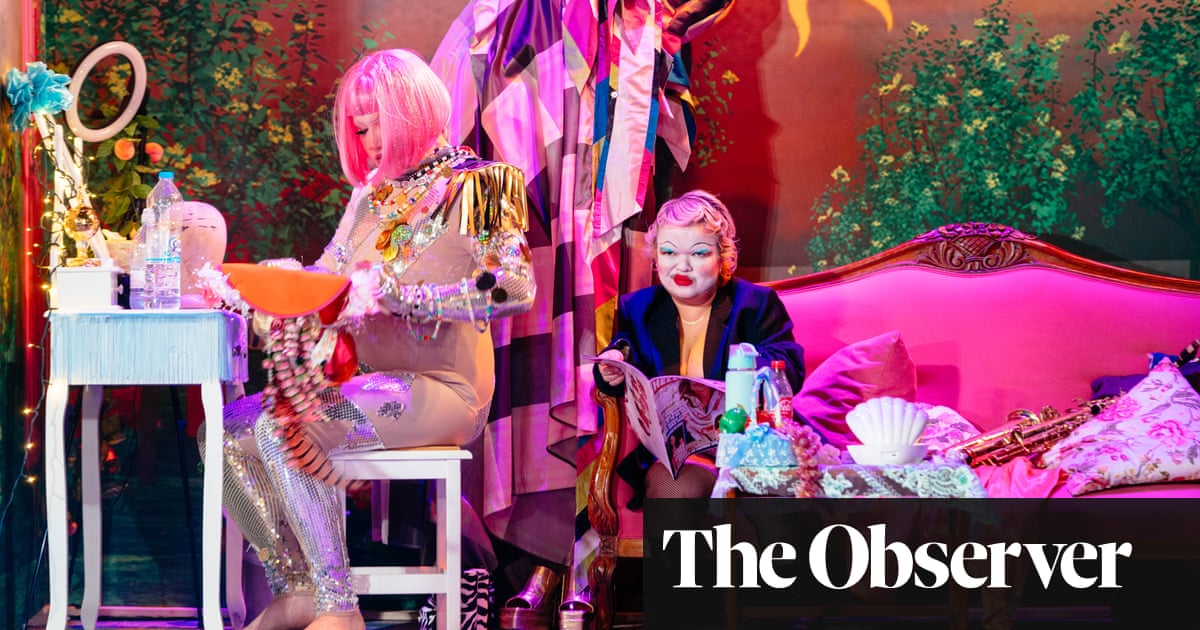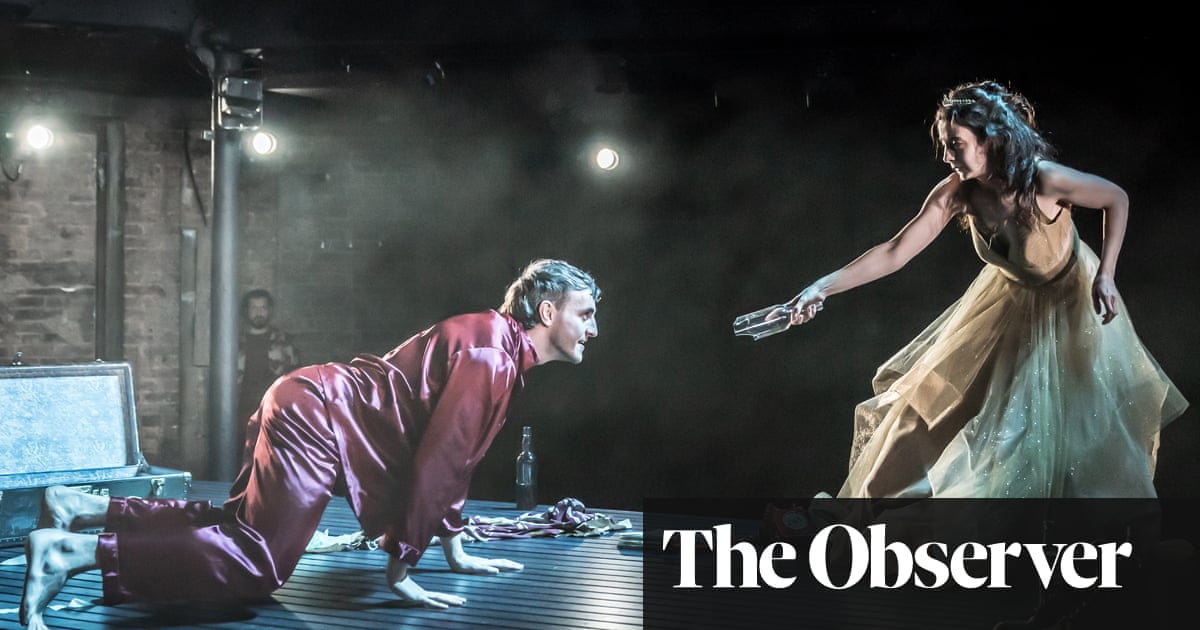
Much Ado About Nothing – that rare Shakespearean comedy in which the heroine does not have to put on doublet and hose to be a wit – is proving to be the play of the summer. Two months ago, Lucy Bailey staged a tremendous 40s version at the Globe, rich in dark tones. Now Simon Godwin pulls off a lighter but truthful interpretation, set in the 30s. He takes on the pun in the title – “nothing” was pronounced “noting” in 1600 – and stages the play so that it hinges not on sparky exchanges but on teasing eavesdrops, spying, mis-notings.
There is expedience in this. As the hate-to-love, love-to-hate couple, John Heffernan and Katherine Parkinson give separately striking performances. Heffernan begins as a desultory discontent and subtly accretes layers of intelligence. Parkinson, wildly poised, gradually grows a heart, her face shining with surprised tears. However, they give off few sparks when together: their exchanges do not fuel the play. The energy is more diffused.
Anna Fleischle’s design creates an art deco hotel, aerating the stage with macaroon colours of eau de nil and rose, and giving its architecture the sly charm of a toy theatre. It revolves and slides open, revealing secret apertures and enclosures. It is embellished with dinky balconies, beach huts and an ice-cream trolley – in which the lovers linger and snoop, getting their heads filled with misunderstandings and their feet trampled. Everyone does very good scuttling.
An onstage band puts swing into Hey Nonny Nonny; in her stage debut, Phoebe Horn brings pizzazz to a motor-mouthed maid. Evie Gurney’s costumes for Parkinson are particularly gorgeous – turbans, satin pyjamas, different dotted patterns on blouse and trousers, a straw hat with an archly bridling feather. Some of the play’s more disturbing moments go missing, but the glide of the action is delectable.
Word-wrenchers are out in force this month at the National. David Fynn’s easy haplessness as the verbally inept Dogberry is one of Much Ado’s assets. Meanwhile Caroline Quentin’s Mrs Malaprop is the centrepiece of Jack Absolute Flies Again – Richard Bean and Oliver Chris’s new take on Sheridan’s The Rivals (1775) which transplants the action to the second world war, during the Battle of Britain.
Quentin, shiny as a creature on a carousel, brings admirable zip to the flinging-herself-around physical comedy (which requires her to do the splits while playing the ukulele) and to the verbal slips – “flatulence will get you everywhere” – that define her character. The trouble is that Bean so overeggs her speech with errors that the lines can scarcely breathe.
The drama does not have the freewheeling expansiveness of his other adaptation, One Man, Two Guvnors, nor the bravura savagery of his England People Very Nice. The jokes are there, all right – but it’s as if they’re coming in to land in an adjacent room.
Emily Burns’s production has well-resourced assurance. Mark Thompson’s design of green, rolling hills – like cardboard cutouts from British Rail travel posters – is spot on. As a forthright maid, Kerry Howard (“I’m a plot device”) delivers her swipes at snobbery with nonchalant defiance. (Being a maid, she is the only one on the cast list without a surname.) There are knockout cameos from Peter Forbes as a blustering puffball in uniform – “Be quiet! I’m shouting!” – and Jordan Metcalfe as a timid lover on concertina legs whose underemployed willy is described in rather adorable detail featuring nests and roll-neck sweaters. Yet for comic invention, and real poignancy, Jack Absolute doesn’t touch the satire on second world war shenanigans that has just ended a run at Riverside Studios. Operation Mincemeat surely deserves a national tour – or a tour at the National.
No wonder Chichester was ovating at the interval of Crazy for You. The musical glories are nonstop: Shall We Dance?, Someone to Watch Over Me, I Got Rhythm. All woven together with constantly varied dance.
Crazy is a concoction, made up of George and Ira Gershwin’s musical numbers, but put together by Ken Ludwig and Mike Ockrent in 1991. It uses an abandoned Gershwin plot (New York smartarse goes west, falls in love and rescues an old theatre) and draws on songs from several shows. Crucially, the first production also drew in Susan Stroman as choreographer. She directs the new production, crediting the original dance arranger, Peter Howard, for having opened the numbers up into dance stories.
It’s a creaky vehicle: the plot is scanty, the dialogue flimsy. Development and detail is all in the swelling voices and frisking toes of Carly Anderson and Charlie Stemp. Anderson goes brightly (if disappointingly) from dungareed can-do to all-over frockiness; Stemp – the linchpin of the evening – tap-dances on a small silver tray, patters over tiny tables, spins and leaps and sparkles. Together, they dance into delight: first squaring up with hoedown elbowing, then swooningly back-bending in a waltz.
This is a revival, not a rethink. Beowulf Boritt’s design – battered plank facades and routine silver art deco – could do with a dust-off: it might have been lifted from a theme park. Still, there is lusciousness in William Ivey Long’s costumes, with pink T-bar heels, bottom-tickling satin tunics, swishing ostrich feathers. There is also some serious weirdness. Women, bound with rope, are strummed like double basses and carried around on pickaxes. Two men, identically dressed and moustachioed (it’s a plot point!), swivel over the stage before eyeballing each other, too drunk to know who is who: “I am beside myself.” So was the audience.
Star ratings (out of five)
Much Ado About Nothing ★★★★
Jack Absolute Flies Again ★★★
Crazy for You ★★★★
Much Ado About Nothing is at the Lyttelton, National Theatre, London, until 10 September
Jack Absolute Flies Again is at the Olivier, National Theatre, London, until 3 September
Crazy for You is at Chichester festival theatre until 4 September












